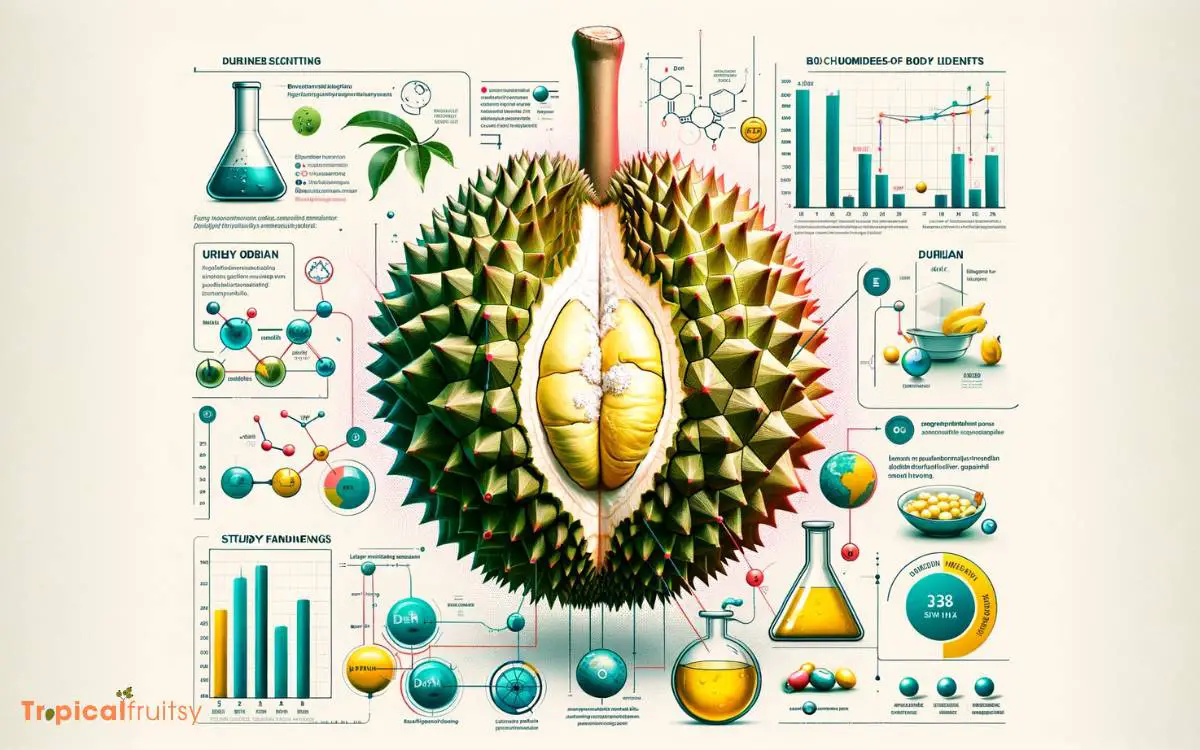Does Durian Make Your Pee Smell? Revealing the Truth!
Yes, durian can affect the smell of your urine. The sulfuric compounds found in durian, which contribute to its strong smell, can also impart a distinctive odor to urine after consumption.
Durian contains various sulfuric compounds, such as thiols, sulfides, and disulfides, that are responsible for its notorious aroma.
When consumed, these compounds can be metabolized and then excreted through the urine, potentially altering its scent. This phenomenon is similar to how foods like asparagus can change urine smell.
The extent to which durian affects urine odor may vary from person to person, depending on individual metabolism and the amount of fruit consumed.
Consuming durian may lead to noticeable changes in urine odor due to its high sulfur content.

Key Takeaway
Impact of Durian Consumption on Urine Odor
| Factor | Description |
|---|---|
| Sulfuric Compounds | Durian contains thiols, sulfides, and disulfides that affect its smell. |
| Metabolic Process | These compounds are metabolized and can alter urine odor. |
| Individual Variability | The change in urine smell varies among individuals. |
| Amount of Consumption | The more durian eaten, the more likely urine will have a distinct odor. |
| Hydration | Proper hydration can dilute urine, reducing the strength of the odor. |
Understanding Durian Composition

Several volatile compounds are present in durian fruit, which contribute to its distinctive aroma and may affect the odor of urine in individuals who consume it.
The primary volatile constituents identified in durian include sulfur-containing compounds such as ethanethiol, methionine, and various thioesters. These components are responsible for the often-pungent smell characteristic of the fruit.
Upon ingestion, some of these compounds may be metabolized and subsequently excreted in urine, potentially altering its odor.
Analytical studies using techniques such as gas chromatography-mass spectrometry (GC-MS) have detailed the complexity of durian’s volatile profile, revealing over 50 distinct compounds.
This diverse array of substances is influenced by the fruit’s ripeness, genetic variations, and environmental factors, all of which contribute to the unique olfactory experience associated with durian consumption.
How Foods Influence Urine Odor

Commonly, the consumption of certain foods, including durian, can lead to noticeable changes in urine odor as a result of the body metabolizing their distinct compounds.
These metabolic processes can yield various volatile substances that are excreted through urine, altering its typical scent.
The influence of food on urine odor can be traced back to several factors:
- Specific compounds such as sulfur in asparagus or methyl mercaptan in durian which are released during digestion and subsequent renal filtration.
- The concentration of urine, which can intensify the presence of odoriferous compounds, is often a result of dehydration or limited fluid intake.
- The individual’s unique metabolism and genetic makeup, which dictate how food compounds are processed and eliminated from the body.
Understanding these factors is crucial in analyzing the link between diet and changes in urine odor.
Research on Durian and Body Scents

Scientific studies have identified various volatile sulfur compounds in durian that contribute to its distinctive odor. These compounds may also affect body scents post-consumption.
Metabolic processes in the human body can modify these compounds. This modification can potentially lead to changes in urine odor.
Given this relationship, it is necessary to examine the specific metabolic byproducts resulting from durian consumption. This examination will help understand their subsequent impact on human body scents.
Durian Metabolic Byproducts
Research indicates that the unique compounds in durian, such as sulfur-containing volatiles, are metabolized by the body and may contribute to distinct body odors, including urine scent.
These metabolic byproducts result from the body’s processing of durian’s chemical constituents, with several key factors influencing the generation and perception of the resulting odors:
- Enzymatic Breakdown: Specific enzymes in the body break down durian’s complex sulfur compounds, leading to the release of smaller, volatile metabolites.
- Individual Variation: Genetic differences in metabolism can affect the types and quantities of volatiles excreted.
- Detection Thresholds: The human olfactory system varies in sensitivity to these metabolites, influencing whether the resulting odor is noticeable.
These points underscore the biochemical complexity behind how durian consumption might affect bodily scents, including urine odor.
Scent Compounds Identified
How do specific scent compounds identified in durian consumption contribute to changes in body odor, including the scent of urine?
Research indicates that durian contains volatile sulfur compounds (VSCs), such as ethanethiol and methanethiol, which are responsible for its pungent aroma.
When consumed, these compounds can be metabolized and subsequently excreted through urine, altering its odor.
Additionally, certain non-sulfur compounds in durian, like esters and ketones, might also be metabolized in a way that affects body scents.
The impact of these compounds on urine scent is an area of ongoing research, yet it is understood that the metabolites are often potent odorants, even at low concentrations.
Personal Accounts and Anecdotal Evidence

Turning from empirical research to individual experiences, numerous consumers of durian have reported alterations in the odor of their urine, which may corroborate the scientific hypothesis of durian metabolites influencing body scents.
These personal accounts vary significantly, highlighting the subjective nature of scent perception and the potential influence of individual metabolic differences.
A systematic analysis of these anecdotal evidences can provide a broader understanding of the durian’s impact on human body odor, although such data should be considered with caution due to the lack of controlled conditions.
Shared Durian Experiences
Among durian consumers, there is a notable variation in reports concerning the impact of this fruit on the odor of urine, with some individuals claiming a distinct change and others observing no difference at all.
To delineate these anecdotal observations, consider the following points:
- Metabolic Differences: Variability in metabolic processing could explain why some individuals notice a change in urine odor post-durian consumption while others do not.
- Sensory Sensitivity: The threshold for detecting changes in urine odor may vary among individuals, influencing their perception of any change.
- Quantity and Frequency: The amount of durian consumed and the regularity of consumption likely play roles in whether the sulfur compounds present in the fruit have a noticeable effect on the urine’s aroma.
These factors underpin the disparate experiences and underscore the complexity of correlating durian intake with changes in urine odor.
Smell Changes Noted
Personal testimonies and anecdotal evidence suggest that durian consumption may lead to noticeable changes in urine odor for some individuals. Such accounts typically emerge from self-reported observations post-ingestion of the fruit.
The described alteration in olfactory characteristics is attributed to the presence of various sulfur-containing compounds in durian, which are known for their potent aromas.
Metabolic processes may convert these compounds into volatiles that are excreted through urine, potentially imparting a distinctive scent.
However, the extent and nature of these changes appear to be highly variable among individuals, suggesting a degree of metabolic and genetic diversity in handling durian’s complex chemical profile.
While scientifically unverified, these personal accounts offer a basis for more rigorous, controlled studies to elucidate the exact metabolic pathways involved.
Individual Scent Perceptions
Frequently, consumers of durian report variations in urine odor, reflecting subjective experiences that underscore the role of individual scent perception.
Analyzing personal accounts reveals a spectrum of scent changes, which may be attributed to:
- Genetic Disposition: Specific genetic markers can affect an individual’s ability to perceive certain scents, potentially influencing the detection of odor changes after durian consumption.
- Metabolic Differences: Individuals metabolize foods at different rates, which can alter the concentration and composition of compounds excreted in urine.
- Hydration Status: The level of hydration can concentrate or dilute urine, impacting the strength and presence of any durian-related scents.
These factors contribute to the anecdotal evidence pool, yet they lack empirical corroboration.
Comparing Durian to Other Foods

How does the impact of durian on urine odor compare to the effects observed when consuming asparagus, coffee, or fish?
Asparagus is notorious for causing a distinctive urine smell due to its asparagusic acid content, which is metabolized into sulfur-containing compounds.
Comparatively, durian contains various volatile sulfur compounds, which could theoretically influence urine odor similarly, although specific metabolic pathways may differ.
Coffee, on the other hand, can impart a different scent due to its complex mixture of chemicals, including caffeine and other polyphenols, which are processed by the body and can alter urine’s composition.
Fish consumption, particularly species rich in trimethylamine oxide, can lead to fishy urine smell in individuals with trimethylaminuria.
Unlike these foods, the degree to which durian affects urine scent remains less documented and requires further biochemical analysis.
Health Considerations and Hydration Tips

Durian consumption, while potentially altering urine odor, also raises considerations regarding its nutritional impact and the importance of maintaining adequate hydration.
Analyzing the fruit’s composition reveals a significant amount of water, yet its rich nutrient profile demands attention to ensure hydration levels remain optimal.
Consider the following health considerations and hydration tips:
- Nutrient Density: Durian is calorically dense and high in carbohydrates and fat, which can affect metabolism and fluid requirements.
- Sulfur Compounds: The presence of sulfur compounds could influence the body’s hydration status and necessitate increased water intake.
- Hydration Balance: To counteract the diuretic effects of certain nutrients within durian, individuals should monitor their fluid intake to maintain hydration.
These analytical points underscore the need for a deliberate approach to water consumption when indulging in durian.
Conclusion
The intricate tapestry of durian’s biochemical constituents may influence the olfactory signature of urine, much as various alimentary inputs can alter corporeal emanations.
While empirical data remains sparse, anecdotal evidence suggests a potential correlation. It is essential to weigh durian’s sensory impacts against its nutritional benefits, maintaining hydration to mitigate any undesirable aromatic effects.
The quest to understand durian’s full systemic impact continues to be a piquant enigma in food science.






